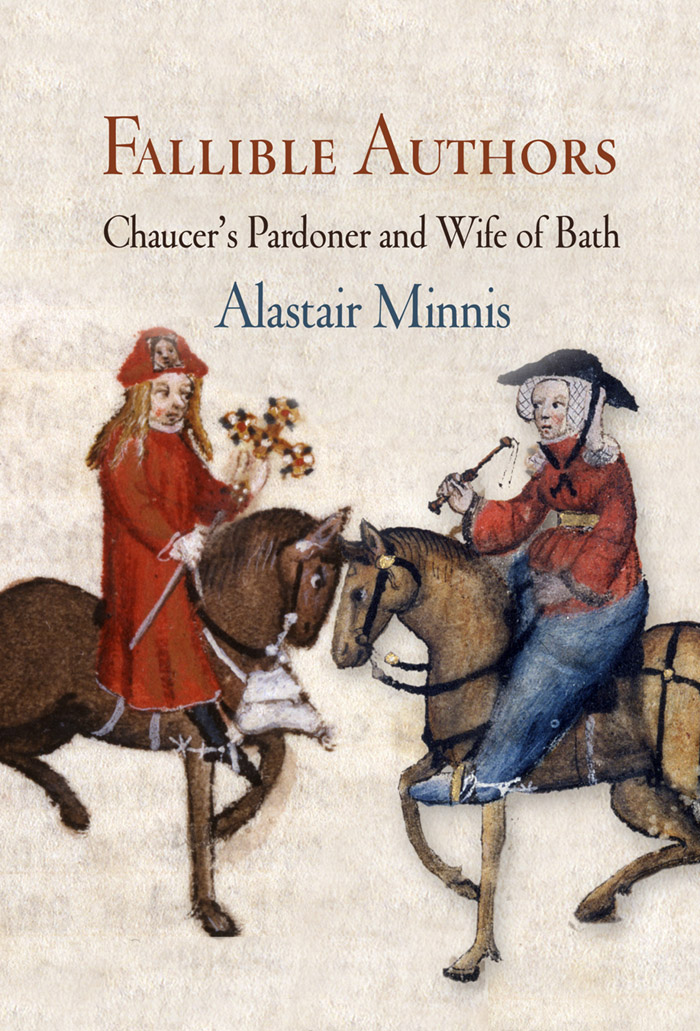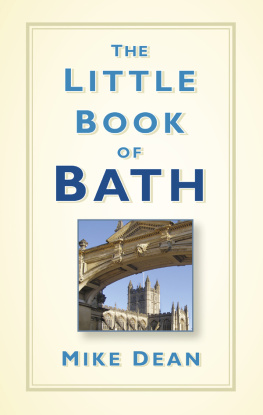Minnis - Fallible Authors Chaucers Pardoner and Wife of Bath
Here you can read online Minnis - Fallible Authors Chaucers Pardoner and Wife of Bath full text of the book (entire story) in english for free. Download pdf and epub, get meaning, cover and reviews about this ebook. City: Philadelphia, year: 2013, publisher: University of Pennsylvania Press, genre: Science. Description of the work, (preface) as well as reviews are available. Best literature library LitArk.com created for fans of good reading and offers a wide selection of genres:
Romance novel
Science fiction
Adventure
Detective
Science
History
Home and family
Prose
Art
Politics
Computer
Non-fiction
Religion
Business
Children
Humor
Choose a favorite category and find really read worthwhile books. Enjoy immersion in the world of imagination, feel the emotions of the characters or learn something new for yourself, make an fascinating discovery.

Fallible Authors Chaucers Pardoner and Wife of Bath: summary, description and annotation
We offer to read an annotation, description, summary or preface (depends on what the author of the book "Fallible Authors Chaucers Pardoner and Wife of Bath" wrote himself). If you haven't found the necessary information about the book — write in the comments, we will try to find it.
Minnis: author's other books
Who wrote Fallible Authors Chaucers Pardoner and Wife of Bath? Find out the surname, the name of the author of the book and a list of all author's works by series.
Fallible Authors Chaucers Pardoner and Wife of Bath — read online for free the complete book (whole text) full work
Below is the text of the book, divided by pages. System saving the place of the last page read, allows you to conveniently read the book "Fallible Authors Chaucers Pardoner and Wife of Bath" online for free, without having to search again every time where you left off. Put a bookmark, and you can go to the page where you finished reading at any time.
Font size:
Interval:
Bookmark:

Fallible Authors
THE MIDDLE AGES SERIES
RUTH MAZO KARRAS
Series Editor
EDWARD PETERS
Founding Editor
A complete list of books in the series is available from the publisher.
Fallible Authors
Chaucers Pardoner and Wife of Bath
ALASTAIR MINNIS
PENE
UNIVERSITY OF PENNSYLVANIA PRESS
PHILADELPHIA
Copyright 2008 University of Pennsylvania Press
All rights reserved. Except for brief quotations used for purposes of review or scholarly citation, none of this book may be reproduced in any form by any means without written permission from the publisher.
Published by
University of Pennsylvania Press
Philadelphia, Pennsylvania 19104-4112
Printed in the United States of America on acid-free paper
10 9 8 7 6 5 4 3 2 1
Library of Congress Cataloging-in-Publication Data
Minnis, A. J. (Alastair J.)
Fallible authors : Chaucers Pardoner and Wife of Bath /
Alastair Minnis.
p. cm. (Middle ages series)
Includes bibliographical references and index.
ISBN-13: 978-0-8122-4030-6 (alk. paper)
ISBN-10: 0-8122-4030-8 (alk. paper)
1. Chaucer, Geoffrey, d. 1400. Pardoners tale.
2. Chaucer, Geoffrey, d. 1400. Wife of Baths tale. I. Title.
PR1868.p3 M56 2007
821.1 22
2007017366
To
SARAH
and
KATHERINE
Contents
Preface
One read black where the other read white, his hope
The other mans damnation:
Up the Rebels, To Hell with the Pope,
And God Saveas you preferthe King or Ireland....
And each one in his will
Binds his heirs to continuance of hatred...
LOUIS MACNEICE, Autumn Journal, XVI
I grew up in Northern Ireland, a land where the scars of the Reformation were still prominently on display. Born on the Protestant Scots Irish side of the religious divide, I knew hardly any Catholics, and certainly had no Catholic friends, until in 1966 I became a student at what was, at that time, the only integrated educational institution in the province, the Queens University of Belfast. There my fascination with medieval Catholic thought beganfostered by the unique Department of Scholastic Philosophy (which taught Thomism rather than the fashionable existentialism on offer in the Department of Philosophy just up the street). I must be one of the few people on the planet for whom reading Aquinas and Ockham was an act of youthful rebellion.
My own family, thankfully, was full of people who had little fear of the unconventional. Part of their take on their Protestant dissenting tradition was the conviction that one had to make ones own life, through faith and works. My grandfather was a striking case in pointand a forceful, though hardly straightforward, influence. Following a disillusioning involvement with the private army which Sir Edward Carson illegally recruited to resist Irish Home Rule in 1914, he settled into an existence wherein pugnacious piety easily coexisted with contempt for many actual clergymen of our acquaintance, together with admiration for the life and works of Joe Stalin, man of steel (whose atrocities in the name of social revolution were as yet unknown). Another of his heroes was local author Alexander Irvine (18631941), now commemorated with a drab little square in the town of Antrim, where the hovel in which he lived as a child is preserved as a tourist attractionsomewhat implausibly, given that Irvines gospel of Christian trade-unionism (the care of fellow-workers in this world and in preparation for the next) is hardly popular nowadays. Originally an uneducated working man like my grandfather, Irvine worked as a newsboy, miner, boxer, and soldier before emigrating to the United States, where he studied theology at Yale University, became a friend of Jack Londons, and served as both missionary and union organizer among the poor in New Yorks Bowery. Here was socialist nonconformity at its most complexand its best.
Irvine further embodies the complexities of Northern Ireland inasmuch as he was the product of a mixed marriage between an illiterate Protestant shoemaker and a clever Catholic farm girl. In My Lady of the Chimney Corner (1913) Anna Irvine is presented as a madonna of the hearth who gains wisdom through the suffering brought about by abject poverty. Her simple but sage pronouncements would not look out of place in Piers Plowman.
The present book may be seen as the outcome of an intellectual mixed marriage, what happens when a product of a Protestant dissenting tradition (which proudly traces its origins back to Lollardy) enters into a relationship with the Other of Catholic orthodoxy in its late-medieval manifestation. In particular, it goes back to my original wonderment at the Catholic location of authority in institutional hierarchy rather than individual state of grace, the power and prestige of the office being supposed to transcend the fallibilities of the human being who holds it. Hence, for example, an immoral priest can (in certain circumstances at least) preach and administer the sacraments without detriment to his congregation, his sin being a private matter between him and God. To which the Protestant response would be that immorality deprives the clergyman of his right to officiate in any such way.
A more recent impetus was provided by the extraordinary events in the United States during late 1998 and early 1999, which saw the publication of the Starr Report on President Clintons dubious conduct and the subsequent impeachment proceedings against him. Here the relationships between the authoritative office and the fallible office-holder, between the public man and what he tried to withhold as his private life, were raised and debated as never before. Clinton himself deployed the discourse of public and private in his television broadcast to the nation on 17 August 1998. Some of the questions put to him by the Office of Independent Counsel and the Grand Jury had, he said, concerned his private life, and hence these were questions no American citizen would ever want to answer. Having conceded that he must take complete responsibility for all [his] actions, both public and private, Clinton went on to emphasize the hurt he had caused the two people I love most, his wife and daughter. I intend to reclaim my family life for my family. Its nobodys business but ours. Even presidents have private lives.
To judge by the opinion polls, a majority of Americans thought so too. And yet, the next president they (marginally) elected, George W. Bush, could hardly be more different in self-image. In Bush country, the private is the political and vice-versa; the same faith that sustains the presidents soul is offered to voters as ensuring their nations salvation (in moral, monetary and military terms). During the 2004 presidential election those who took up that offer professed themselves drawn to Bush by his morals and his character; the interrelated values of faith, family, integrity and trust which the Bush campaign consistently projected proved unbeatable.
As I write, Bush is halfway through his second term and the jury is, so to speak, still out on the success or failure of his presidency. However, at the beginning of a book which will spend so much time with Chaucers Pardoners Tale, it seems appropriate to recall how Senator Robert Byrd used this very text as he urged the U.S. Senate to handle the Clinton impeachment investigation in a reasonable and consensual manner. He reminded his colleagues of how, in that tale, three men find a pot of gold only to kill one another to get it all. Leaving aside the obvious quibble over whether a pot of gold was an appropriate metaphor to apply to Starrs findings, one might suggest that the senators could have noted another major aspect of Chaucers text: its claim that an immoral man can tell a moral tale. Or, as in the case of the morally flawed but highly professional Bill Clinton, preside over a successful economy and pursue policies at home and abroad which history may appraise with respect and sympathy, particularly when viewed in relation to those of a successor whose supposedly sound morals and character were made the basis of his fitness to lead. To quote a bumper sticker I see frequently in New Haven, nobody died when Clinton lied.
Font size:
Interval:
Bookmark:
Similar books «Fallible Authors Chaucers Pardoner and Wife of Bath»
Look at similar books to Fallible Authors Chaucers Pardoner and Wife of Bath. We have selected literature similar in name and meaning in the hope of providing readers with more options to find new, interesting, not yet read works.
Discussion, reviews of the book Fallible Authors Chaucers Pardoner and Wife of Bath and just readers' own opinions. Leave your comments, write what you think about the work, its meaning or the main characters. Specify what exactly you liked and what you didn't like, and why you think so.




